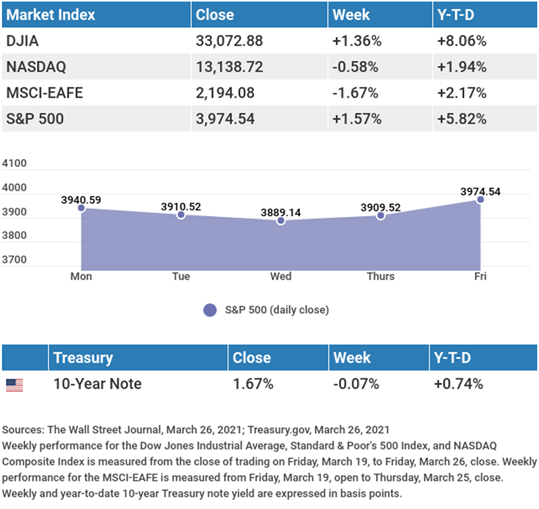
A rocky week with wide price swings led to mixed results for stocks last week, as investors grappled with anxieties over economic growth and weakness in technology and other high-growth stocks.
The Dow Jones Industrial Average added 1.36%, while the Standard & Poor’s 500 gained 1.57%. The Nasdaq Composite index fell 0.58% for the week. The MSCI EAFE index, which tracks developed overseas stock markets, slipped 1.67%.1,2,3


Stocks Churn
After a promising start to the week, stocks turned negative on mounting concerns about economic growth in Europe, with broad losses in energy, cyclicals, and technology.
Though bond yields backed off their highs and Secretary of the Treasury Janet Yellen and Fed Chair Jerome Powell both struck an optimistic tone on the economy, stocks posted back-to-back losses on Tuesday and Wednesday.
Thursday trading was emblematic of the week’s volatile action. The S&P 500 dropped nearly one percent earlier in the day following Powell’s comment about the Fed eventually rolling back its bond purchase program, then rallied to close with a 0.5% gain.4
Stocks rallied into the Friday close, pushing the Dow and S&P 500 into positive territory and paring the losses on the Nasdaq Composite.
Tech Remains Under Pressure
The losses in technology and other high-growth stocks in recent weeks have largely been attributed to the sharp and rapid rise in bond yields.
So, it was both interesting and a bit confounding that last week saw yields pull back, and rather than helping support these companies’ stock prices, many technology stocks continued to decline. The failure to rally on lower yields may be pointing to other reasons for their price weakness. Some are concerned about current prices, and believe there may be better growth opportunities in more fairly-valued companies. The “fear of missing out” that propelled investors to pile into these stocks over the last twelve months appears to have moderated.
Robert Roman
CEO, Managing Director
THIS WEEK: KEY ECONOMIC DATA
Tuesday: Consumer Confidence.
Wednesday: ADP (Automated Data Processing) Employment Report.
Thursday: Jobless Claims. ISM (Institute for Supply Management) Manufacturing Index.
Friday: Employment Situation Report.
Source: Econoday, March 26, 2021
The Econoday economic calendar lists upcoming U.S. economic data releases (including key economic indicators), Federal Reserve policy meetings, and speaking engagements of Federal Reserve officials. The content is developed from sources believed to be providing accurate information. The forecasts or forward-looking statements are based on assumptions and may not materialize. The forecasts also are subject to revision.
THIS WEEK: COMPANIES REPORTING EARNINGS
Tuesday: Lululemon Athletica (LULU), Chewy, Inc. (CHWY).
Wednesday: Micron Technology, Inc. (MU), Walgreens Boots Alliance (WBA).
Thursday: Carmax, Inc. (KMX).
Source: Zacks, March 26, 2021
Companies mentioned are for informational purposes only. It should not be considered a solicitation for the purchase or sale of the securities. Investing involves risks, and investment decisions should be based on your own goals, time horizon, and tolerance for risk. The return and principal value of investments will fluctuate as market conditions change. When sold, investments may be worth more or less than their original cost. Companies may reschedule when they report earnings without notice.

“Always it’s spring and everyone’s in love and flowers pick themselves.”
– E.E. Cummings

Reporting Cash Payments
Expecting a little extra cash from a gift, sale, or trade? The IRS wants to know. Individuals, corporations, and partnerships to report cash transactions of more than $10,000.
These cash payments can include jewelry sales, a gift from a family member, an overseas purchase, or any other cash transaction. You also need to report cash payments that were received in one lump sum, in two or more related payments within 24 hours, and as part of a single transaction or two or more transactions in the last year.
Luckily, reporting cash payments is simple. All you have to do is file Form 8300, Report of Cash Payments Over $10,000 Received in a Trade or Business. The form requires information about both the giver and the receiver of the cash, a description of the transaction, and information about any other parties involved.
* This information is not intended to be a substitute for specific individualized tax advice. We suggest that you discuss your specific tax issues with a qualified tax professional.
Tip adapted from IRS.gov5

The Health Benefits of a Meat-Free Day
There’s no denying the overwhelming health benefits of a plant-based diet. But going completely vegetarian or vegan isn’t realistic for everyone. Luckily, you can still enjoy the many health benefits by going “meat free” for just one day a week. Here are some of the main benefits of this healthy lifestyle swap:
- You’ll be cutting out potentially dangerous processed meat – According to the World Health Organization, processed meats rank alongside cigarettes as a major cause of cancer.
- You’ll be decreasing your risk of heart disease – Coronary heart disease is linked to a meat-based diet, and the majority of cardiovascular diseases can be prevented by switching to a plant-based diet.
- You’ll be getting more vitamins, minerals, and fiber – When you don’t turn to meat on your meat-free day, you’ll likely turn to other foods such as veggies, fruits, whole grains, and other plant-based products. This variety helps you round out your diet!
These are just a few of the many benefits of going plant-free for a day. Want more inspiration? Just google “Meatless Monday” for recipe suggestions.
Tip adapted from MindFood.com6

Christine likes grapes but not potatoes. She likes squash but not lettuce, and peas but not onions. Following the same rule, will she like pumpkins or apples?
Last week’s riddle: I have no heart or mind, but I do have two legs. Yet they only touch the ground when I am not carrying things around. What am I? Answer: A wheelbarrow.


Footnotes and Sources
1. The Wall Street Journal, March 26, 2021
2. The Wall Street Journal, March 26, 2021
3. The Wall Street Journal, March 26, 2021
4. CNBC, March 25, 2021
5. IRS.gov, September 19, 2020
6. MindFood.com, September 23, 2020
Investing involves risks, and investment decisions should be based on your own goals, time horizon, and tolerance for risk. The return and principal value of investments will fluctuate as market conditions change. When sold, investments may be worth more or less than their original cost.
The forecasts or forward-looking statements are based on assumptions, may not materialize, and are subject to revision without notice.
The market indexes discussed are unmanaged, and generally, considered representative of their respective markets. Index performance is not indicative of the past performance of a particular investment. Indexes do not incur management fees, costs, and expenses. Individuals cannot directly invest in unmanaged indexes. Past performance does not guarantee future results.
The Dow Jones Industrial Average is an unmanaged index that is generally considered representative of large-capitalization companies on the U.S. stock market. Nasdaq Composite is an index of the common stocks and similar securities listed on the NASDAQ stock market and is considered a broad indicator of the performance of technology and growth companies. The MSCI EAFE Index was created by Morgan Stanley Capital International (MSCI) and serves as a benchmark of the performance of major international equity markets, as represented by 21 major MSCI indexes from Europe, Australia, and Southeast Asia. The S&P 500 Composite Index is an unmanaged group of securities that are considered to be representative of the stock market in general.
U.S. Treasury Notes are guaranteed by the federal government as to the timely payment of principal and interest. However, if you sell a Treasury Note prior to maturity, it may be worth more or less than the original price paid. Fixed income investments are subject to various risks including changes in interest rates, credit quality, inflation risk, market valuations, prepayments, corporate events, tax ramifications and other factors.
International investments carry additional risks, which include differences in financial reporting standards, currency exchange rates, political risks unique to a specific country, foreign taxes and regulations, and the potential for illiquid markets. These factors may result in greater share price volatility.
Please consult your financial professional for additional information.
This content is developed from sources believed to be providing accurate information. The information in this material is not intended as tax or legal advice. Please consult legal or tax professionals for specific information regarding your individual situation. This material was developed and produced by FMG Suite to provide information on a topic that may be of interest. FMG is not affiliated with the named representative, financial professional, Registered Investment Advisor, Broker-Dealer, nor state- or SEC-registered investment advisory firm. The opinions expressed and material provided are for general information, and they should not be considered a solicitation for the purchase or sale of any security.
Copyright 2021 FMG Suite.

